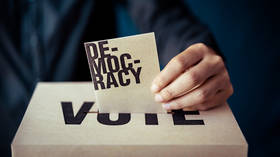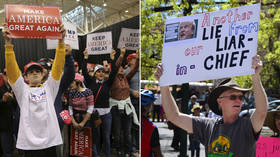The elite say too much democracy is undemocratic, but they just want to stop the ‘wrong sort of people’ winning elections

Many in the establishment believe democracy has gone too far. But there is little to back up this line of thinking – it’s simply a realisation that their opinions are being drowned out by populists.
‘Democracy works better when there is less of it’ warns Financial Times commenter Janan Ganesh. As far as he is concerned, “no global trend is better documented than the crisis of democracy,” by which he means that too often people vote against the advice of the elites.
Ganesh joins the ranks of a small army of leader writers in the mainstream media who condemn democracy and the supposed stupidity of the electorate. “Too much democracy is bad for democracy” says a headline in The Atlantic. The Economist concurs and claims that “too much democracy threatens freedom.”
What these warnings about ‘too much democracy’ really mean is that what’s needed is a form of democracy that makes it difficult, if not impossible, for people to vote for Brexit or for candidates they label as populists. Arguing in this vein, Ganesh states that if there were “curbs on direct democracy” then British public life “would now be less poisoned had it had them.”
Disappointed by the recent electoral successes of the wrong kind of people, this hostility towards both populism and democracy is often uncontained.
During the coronavirus epidemic, some have speculated whether this was a virus that could kill populism or make it stronger. With a hint of hope, one Wall Street Journal commenter asked, “Will coronavirus kill populism?”
Since June 2016, when the British electorate voted for Brexit, opponents of this decision often resort to a language of panic when they discuss democracy.
They have little genuine love for democracy. This sentiment is most strikingly communicated in the mainstream’s hostility to movements it describes as populist. The term populist is often used as a term of abuse by many academic commenters. Two Dutch academics, Koen Abts and Stefan Rummens, claim that populists are “no longer ordinary adversaries, but political enemies.”
They add that “it is important that populist parties, to the extent that they are inimical to democracy, should be revealed as such, treated accordingly and, if necessary, isolated from power.” This representation of populism as an enemy that needs to be isolated explicitly seeks to quarantine society from its pernicious doctrines.
In recent years, the electoral success of populist movements and causes has led elite policy makers and commenters to voice anxiety about the fragility of democratic decision-making. In many cases – at least among the anti-populist commenters and elites – the previous begrudged acceptance of democracy has given way to what I characterise in my forthcoming book, Democracy Under Siege as Democracy Panic.
Also on rt.com Use of AI & digital ads in politics shows it’s a snake oil world of deception, manipulation & contempt for ordinary peopleIf you doubt the prevalence of Democracy Panic, don’t just take my word for it. Go to any large bookshop and you will find one recently published book after another attacking and criticising democracy. Since the publication of Jason Brennan’s invective against the people – Against Democracy (2006) – there has been a veritable renaissance in the publication of elitist, anti-democratic tomes.
In recent years, skepticism towards the value of democracy has mutated into outright condemnation in response to the failure of anti-populist interests to make headway in recent elections. For the philosopher A.C. Grayling, the author of Democracy and its Crisis (2017), the results of the referendum over Brexit and of the 2016 US presidential election serve as proof that “something has gone seriously wrong in the state of democracy.”
Grayling is far from alone in condemning democracy for allowing populist movements to make significant headway. Steven Levitsky and Daniel Ziblatt’s book How Democracies Die (2018) points to “democratic backsliding,” which apparently “begins at the ballot box.” In this and other studies, democracies’ defects are attributed to the unpredictable and irrational behaviour of the people.
The coupling of democracy with the metaphor of death is also highlighted in a feature in Foreign Affairs, which has as its title ‘Is Democracy Dying’? Books with titles such as Saving Democracy From Suicide, Democracy In Chains, and How Democracy Ends communicate a dystopian sense of foreboding about democracy, based on what they regard as its inability to deliver the right results.
Garett Jones’ 10% Less Democracy: Why You Should Trust Elites A Little More And The Masses A Little Less only wants a little bit less democracy and a little bit less accountability so that the experts can get on with deciding what’s in our best interest.
The current wave of anti-populist and anti-democratic literature is underpinned by a profound sense of anxiety about the loss of elite authority. Yet its authors consistently fail to acknowledge that this authority has been unravelling for many decades.
The literature promoting Democracy Panic rarely asks itself why representatives of the political establishment struggle to challenge and neutralise the appeal of its populist opponents. Rather than explore the implications of the loss of its authority, they find it much easier to point the finger of blame elsewhere; namely, in the moral deficiencies of voters.
The belief that drives Democracy Panic is the conviction that the people cannot be trusted. They are derided and blamed for failing to act in accordance with the wisdom of their political and cultural superiors. As one commenter asserted in The Atlantic, “our most pressing political problem today is that the country abandoned the establishment, not the other way around”.
Yes, many citizens have lost their trust in the establishment. Why? Because they finally realised that their leaders were not following. The people, unlike the commenters in the elite media, want more democracy and not less. And thanks to their democratic instincts they are beginning to find their voice.
Frank Furedi’s Democracy Under Siege: Don’t Let Them Lock It Down! Is published on 30 October by Zer0 Books.
Think your friends would be interested? Share this story!
The statements, views and opinions expressed in this column are solely those of the author and do not necessarily represent those of RT.
















